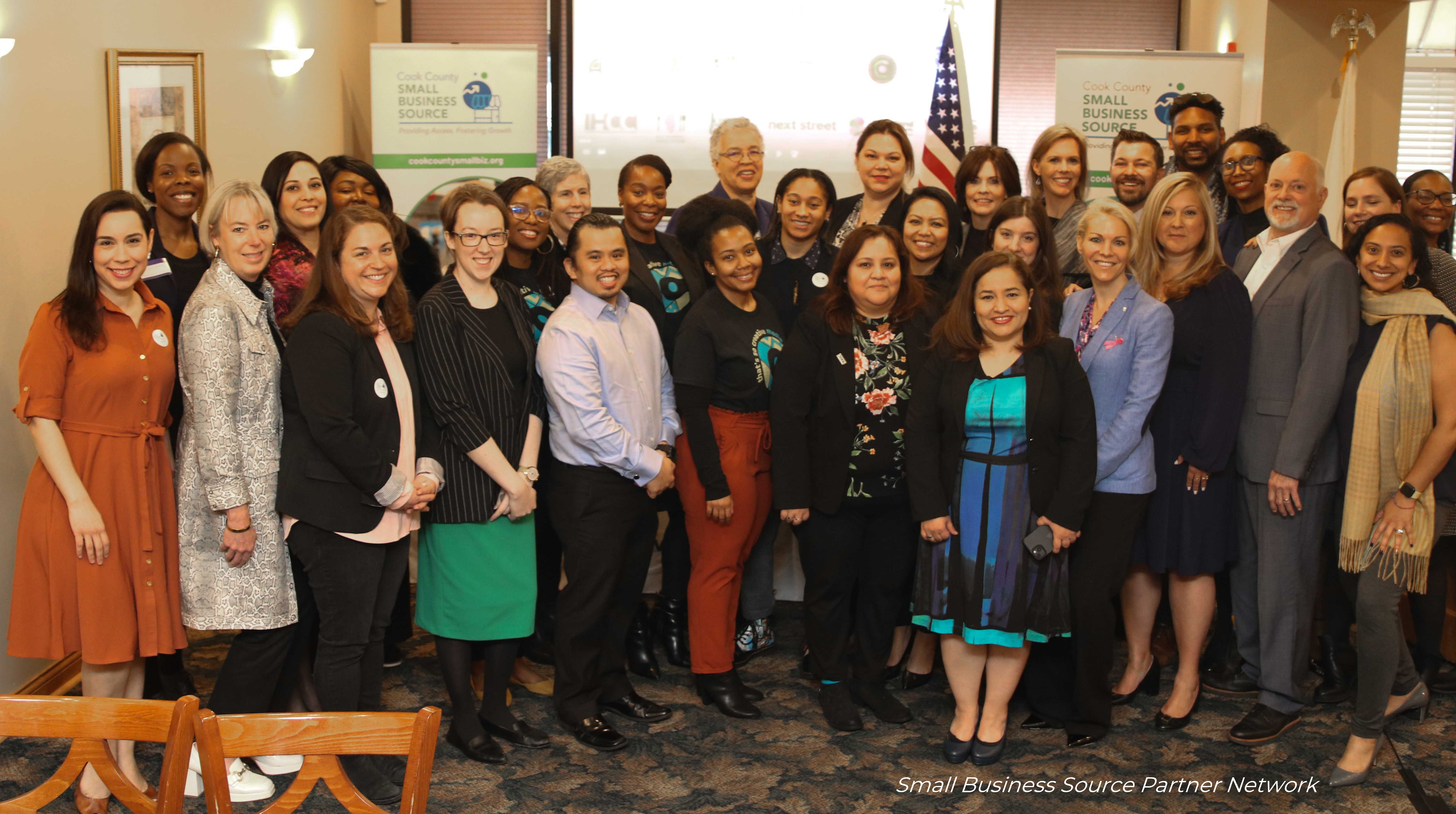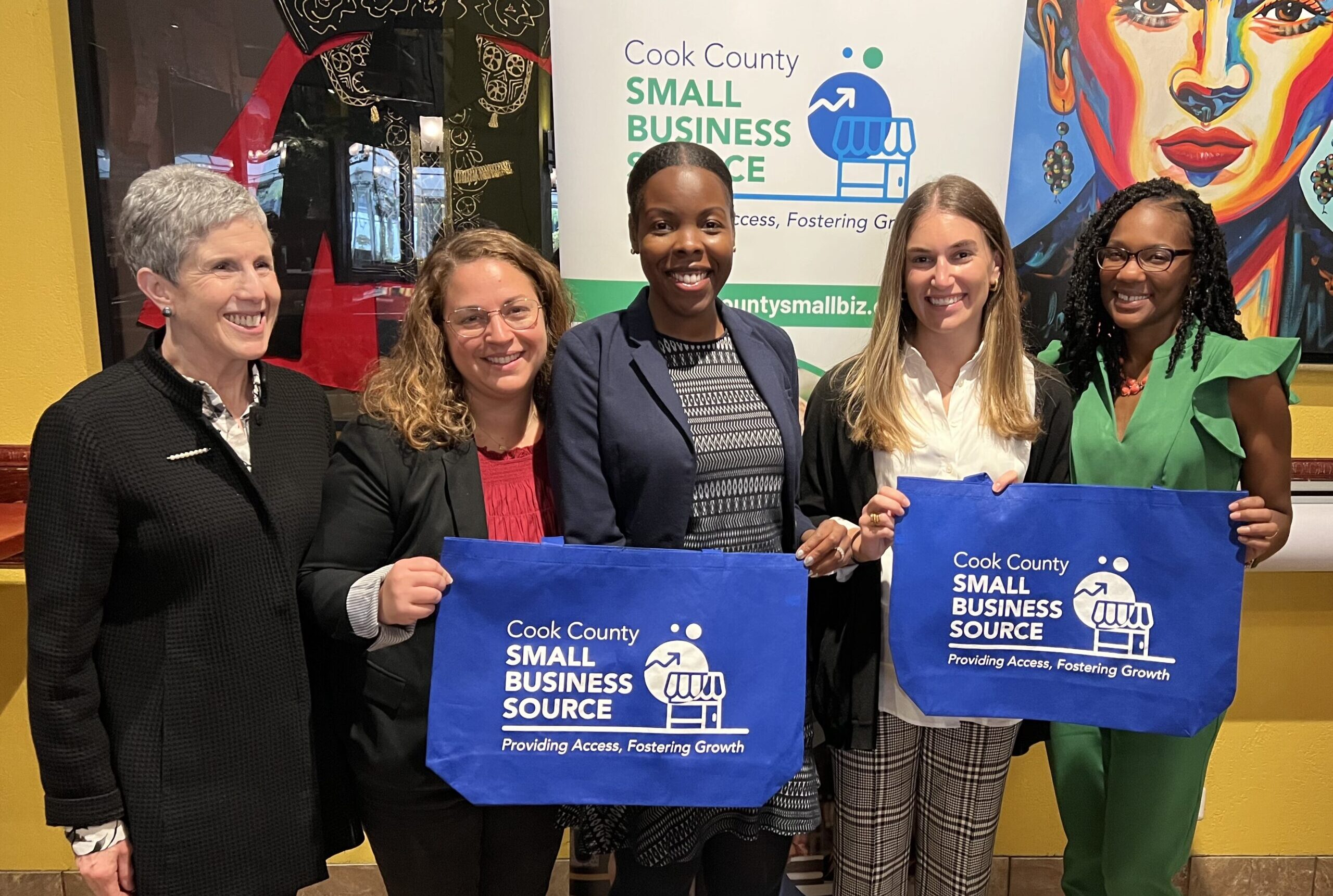In celebration of National Small Business Week, Next Street spotlights one of our most notable programs in partnership with Cook County – The Small Business Source. We spoke to Irene Sherr, Deputy Bureau Chief, Bureau of Economic Development, along with Sara Dinges, Director at Next Street, to share their thoughts on the one-year anniversary rebrand and relaunch of The Source along with the challenges and opportunities of designing and building out this program.
The Small Business Source is in its third year, and recently celebrated the one-year anniversary from rebranding and relaunching the program. Thinking back to the early days of designing the program, what were the small business challenges that you set out to solve with this program?
Irene Sherr: In the wake of the COVID-19 pandemic, small businesses encountered unprecedented disruptions to their operations and faced a radically different business environment, heightening the need to assist small businesses. Businesses needed assistance stabilizing their finances, finding talent, and regaining market share. We wanted to provide small businesses with a trusted advisor who could help them navigate through the “crisis” and come out stronger on the other side.
Next Street has been working within the small business ecosystem in Chicago and Cook County for several years – how did that work inform the design and launch of the Small Business Source?
Sara Dinges: In 2018-19, Next Street worked with key stakeholders from the Chicago/Cook region to deliver an ecosystem assessment. When the COVID-19 pandemic hit, Next Street was able to help reconvene these stakeholders to ensure a rapid response, coupled with long term solutions, to provide critical assistance to both Business Support Organizations and small business owners throughout Cook County. The Cook County Small Business Source was a direct result of that work – rolling out capital, resources and technical assistance programming to serve predominantly historically excluded entrepreneurs.
What do you think sets The Source apart from other small business support efforts – what has made it so successful?
Irene Sherr: There are three key elements that continue to make it successful.
- Cook County’s deep commitment to equity and support for small businesses owned by historically excluded populations. Because of that, the County committed over $85 Million of American Rescue Act funds to advance business resiliency.
- We are stronger together. In partnership with Next Street, the Women’s Business Development Center and the Chicago Community Trust’s Fund for Equitable Growth, we developed a robust network of 40+ community partners who provide small business advising services, outreach and engagement services, and grant application support. These partners serve as ‘boots on the ground’ in Cook County resulting in a significantly larger percentage (in some cases double) of program beneficiaries that are businesses owned by people from historically excluded communities in comparison to other small business assistance programs in the Midwest.
- A centralized, coordinated and data driven program structure that allows us to readily track progress (and challenges), adjust and pivot as necessary, and tell our story and impact.

What is an impact or aspect of the program you’re proud of?
Irene Sherr: We’ve had so many notable impacts that it’s hard to pinpoint one, and so, I’m going to share some of the highlights. Since 2020, the Cook County Small Business Source has reached over 46,800 small businesses and provided direct assistance (via business advising and events) to over 10,000 small businesses.
In 2022 alone, the Cook County Small Business Source served nearly 5,500 businesses via business advising and events in partnership with an extensive network of BSOs and community partners. Covering a diverse landscape, serving suburban small businesses has remained a focus for the program, with 74% of businesses advising clients based in suburban Cook County. The Source has continued to serve small businesses in historically excluded groups, with 69% of business advising clients identifying as people of color, 57% of clients being women-owned businesses, and 96% of small businesses identifying as a microbusiness (less than ten employees).
Sara Dinges: At the center of The Source’s robust business services is a technology interface that allows for efficient “matchmaking” between a small business and an advisor and that also collects and measures data for Cook County and their partners. The program has been designed and is operated hand-in-hand with these tech-enabled and measurement systems in order to illustrate The Source’s reach and impact, ensuring that the County’s investment is at work.
